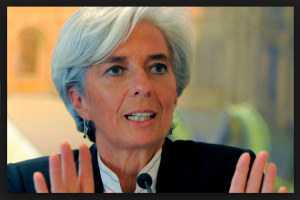IMF Managing Director, Christine Lagarde, told top officials at the Jackson Hole Economic Symposium, Wyoming, that unconventional central bank monetary policies have bought the time and space for global policymakers to implement reforms required to lay the foundation for solid and lasting growth.
She added that global policymakers need to work better together to restore stability and long-term growth.
The annual Jackson Hole Economic Symposium is attended by academics, policy experts, and central bankers.
These policies, such as central banks pumping money into the economy by purchasing assets to support financial stability and boost activity, have allowed the world economy to come out of the financial crisis hole.
When Lagarde called on policymakers to “use this time wisely”, she stressed two points:
- Policymakers need to work better together, they need to understand more deeply what the impact of these unconventional policies have been on local and global economies.
- “All policymakers, within countries and across countries – have a responsibility to take the full range of actions needed to restore growth and stability.”
Positive impact on the global economy
Lagarde said that, according to the IMF’s assessment, the impact of unconventional monetary policies has been positive. Overall, countries have benefited, initially from lower risks of financial turmoil, then from more rapid economic growth.
The IMF has estimated that the U.S. Federal Reserve purchase of assets has lifted world output by over 1%. Unconventional monetary policy has been a success, even though most of the major gains occurred in the early phases, Lagarde said.
The period of exceptionally loose monetary policy cannot go on forever. However, Lagarde emphasized that there should be “no rush to exit” either.
When this exit occurs depends on the circumstances of each country. Lagarde said, “In Europe, for example, there is a good deal more mileage to be gained from UMP (unconventional monetary policy). In Japan, too, exit is very likely some way off. One thing we can say for certain: The path to exit will and should depend on the pace of recovery.”
Exit will take us to uncharted territory
Just as entry into unconventional monetary policies was uncharted territory, so will exit, Lagarde added. “Therefore, the IMF and policymakers need to start thinking about what exit will eventually look like.”
Christine Lagarde highlighted a few aspects:

Balancing stability and risk taking – a main concern for the IMF is how to balance the need for stability with risk-taking.
Long-term loose monetary policy with super-low interest rates, combined with the hunt for higher yields might be a recipe for excessive risk-taking. “On the other hand, if unconventional monetary policies had not been implemented, the result might have been lower growth and greater risk of financial distress.”
Spillover effects on other countries – Lagarde said the IMF has been looking out for episodes of rising capital flows as well as increases in asset prices in emerging market economies after unconventional monetary policies were implemented.
The IMF has also been checking for foreign exchange exposure in these markets. “The situation can turn quickly – as we have seen in recent days in some emerging market economies.”
However, disentangling the effects of unconventional monetary policy from other factors that affect economic outcomes may be challenging. Lagarde said “Not everyone agrees about the size, or even direction, of spillovers. Bridging or even narrowing these differences is an important step toward deciding the future course of policy.”
Sequencing to exit – what exactly does “exit” mean? It will need to be defined precisely, Lagarde pointed out. Unconventional and conventional policies are frequently lumped together. Exit will involve both, although “conventional” aspects will be reversed first.
Lagarde said “Exit is likely to be slower and longer than is often portrayed, and feared.”
Clear communications – central banks must strive to communicate clearly what the risks to recovery are if the exit is rushed, and the dangers for financial stability explained if it is delayed too long.
Lagarde said “Even if well managed, exit from UMP (unconventional monetary policy) may well present other, non-UMP countries with an arduous obstacle course.”
A better mix of policies
Even though monetary policy has been part of the solution for the current crisis, Lagarde warned that “it cannot provide all the answers.”
For more enduring, balanced growth, unconventional policies have to be complemented by a wider range of policies. If not enough is done in other fronts, all the hard work done so far by the central banks could be wasted.
Lagarde said “In the advanced economies pursuing unconventional monetary policies, this means making progress on medium-term fiscal, financial, and structural reforms.”
Other nations need to implement deeper reforms if they are serious about medium-term growth.
Outcomes depend on good coordination
Lagarde explained “Policies and policy coordination are not yet where they need to be. Failing to act at the global level, with each country playing its part, could put the global recovery at risk. With action, however, we can place the world economy on a path of strong, sustainable, and balanced growth.”
She added “We all need to work better together. In today’s interconnected world, the spillovers from domestic policies – unconventional monetary policy included – may well feed back to where they began.”
